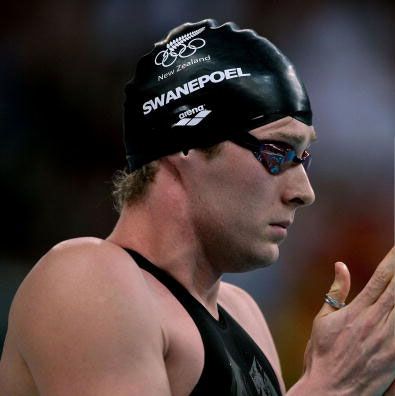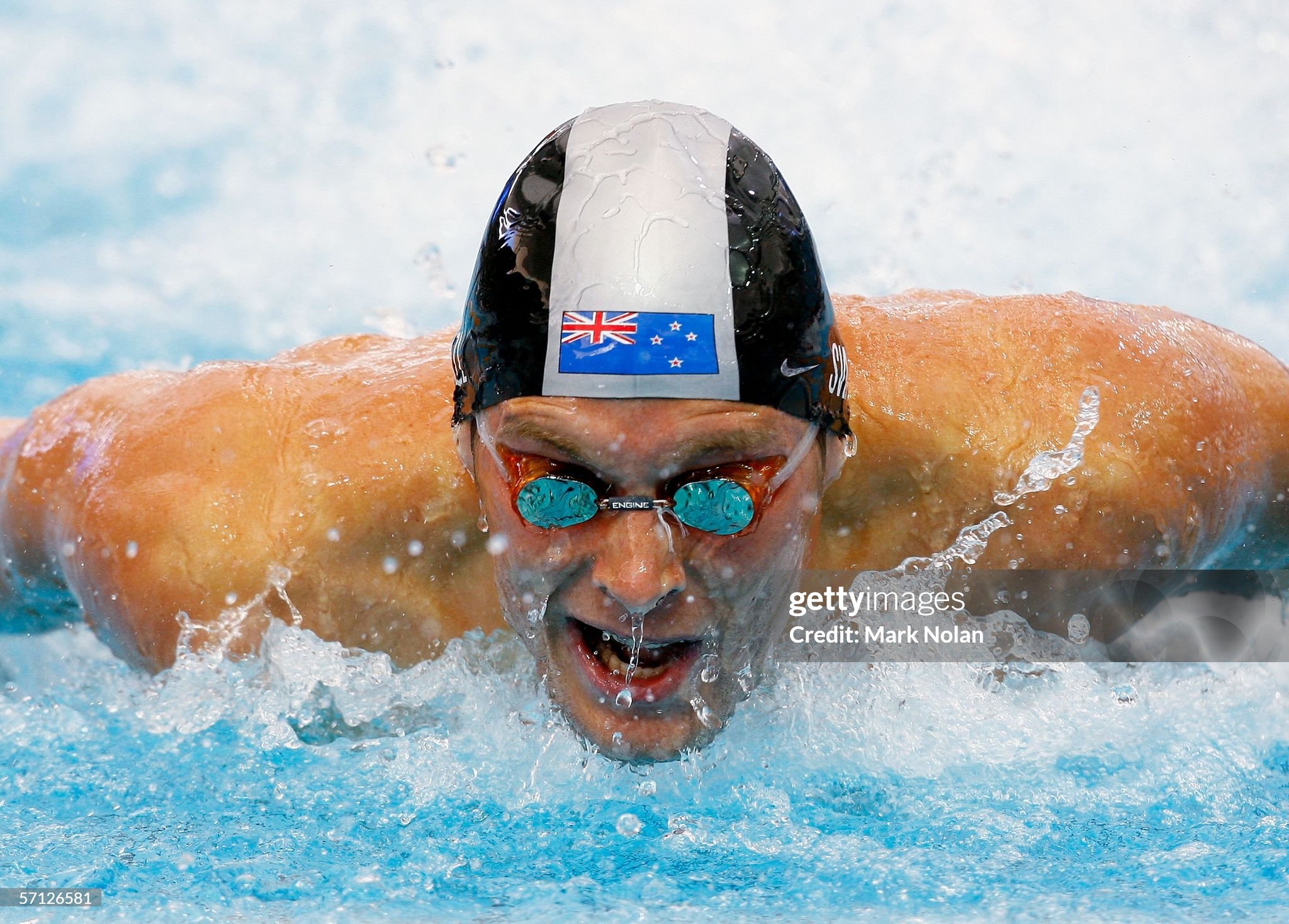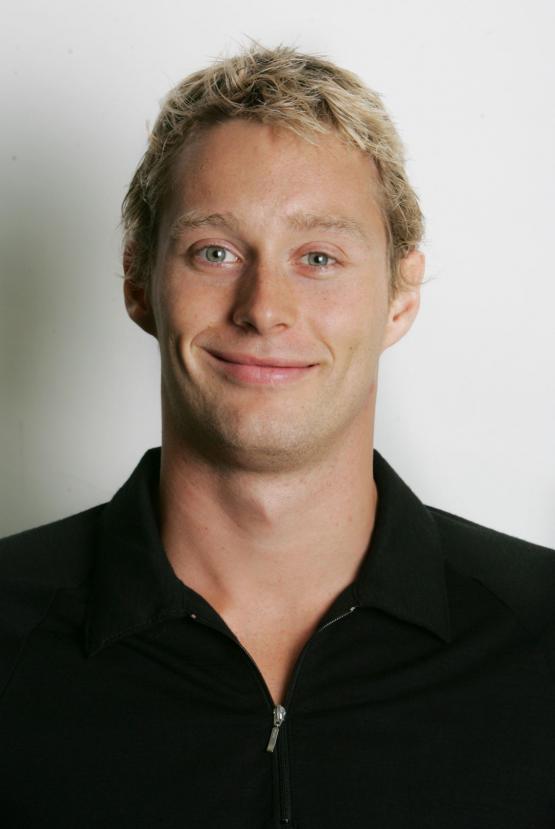Swimming: Corney Swanepoel, a key medal hope
IN THE winter of 2002, Swanepoel was a teenager growing up in Cape Town, happy in his boys' school, thriving at the Vineyard swim club. Swanepoel had been swimming since he was 9, starting with the Dolphins club in his hometown of Potchefstroom, in the gold-mining heart of South Africa.
He threw himself into all swimming strokes, except butterfly - sitting on the side of the pool, stubbornly ignoring the pleas of his coach to give it a go.
Every Saturday, the little Dolphins would travel to a swim meet in a different town, and Swanepoel would struggle to do one 50m length in butterfly. His mother, Cindy, remembers how three-quarters of the way down the pool, Corney would splutter and choke and have to walk his way to the side.
His parents squirmed in the stands when Swanepoel lined up in his first 100m fly race - knowing he had never made it to 50m. Yet it became the defining moment in Swanepoel's career.
"When the whistle blew to get up on the starter blocks, Corney was the only one up there - he was the only entry," Cindy says. "He swam the first 50, then turned and swam home. When he touched the wall, he looked up and said, 'Oh wow, I finished!' And everyone in the crowd stood up and clapped and cheered.
"Everyone knows Corney is easy-going, but his other strong characteristic is his extreme determination."
From that race, Swanepoel found his wings. He developed an exceptional technique and perfect rhythm in the most demanding of swimming disciplines.
And his coaches soon discovered he had that rare "feel" for the water that a select few swimmers possess. It's about not just dipping a hand in the water, but naturally feeling your way through it. Danyon Loader had it; swimming's latest superstars, Ian Thorpe and Michael Phelps, have it too.
"It's hard to explain, but instead of just pushing your arms through the water, you're pulling yourself over the water," Swanepoel says. "I don't think about it, it just happens."
In 2002, Swanepoel was setting South African national age-group records in butterfly, some of which still stand today, and representing his country for the first time. He was happy under the coaching of former Hungarian waterpolo star Karoly von Toros, a big-voiced, bare-chested man, who had already coached Sarah Poewe to become the world short-course breaststroke champion.
Then Swanepoel's parents - Faan, an Army officer, and Cindy, a university registrar - suggested the family move to New Zealand, where there were better work and education opportunities for their three sons.
The Swanepoels had friends who had successfully emigrated to the South Island two years before. Corney and his two older brothers were not impressed.
"Naturally, when Mum and Dad broke the news to me that we were moving to New Zealand, I was upset. I didn't want to leave," Swanepoel says.
Cindy admits it was a heart-wrenching decision to take her reluctant sons away from their home and their friends. "They were apprehensive, and that's totally normal. But we wanted to give them the best opportunities, and we didn't consider anywhere else but New Zealand."
Rather than poking a pin at a map, the Swanepoels asked von Toros to find them the best swimming coach in New Zealand, and that is where they would settle. Von Toros threw up just one name - North Shore swimming sage and New Zealand coach Jan Cameron.
He emailed Cameron, letting her know one of his best young swimmers was moving to New Zealand. "And I said, 'Thank you very much'," says a grateful Cameron. The two coaches are now in email contact every time Swanepoel swims.
The family set up home in Browns Bay. The North Shore bays are a popular community for South Africans, but the Swanepoels say they moved there because it was close to the Millennium Institute, where the North Shore Swimming Club is based.
At first Swanepoel was a quiet member of Rangitoto College, which borders the Institute grounds, but his teachers say it took only a couple of weeks for the charm and self-confidence to come bubbling to the surface.
Barely a hint of a South African accent remains, and his preferred footwear is a pair of good old Kiwi Jandals. Summer or winter, Swanepoel goes to school dressed in his shorts, Jandals, hoodie and sunglasses - just one of the seventh form crowd.
"He's had no trouble making friends here," says teacher Dave Mackay. "Most people would know who he is, and that's quite an achievement in such a big school."
As much as he wanted to blend in, Swanepoel grabbed the chance to make his name known throughout New Zealand. Within five months of arriving he was smashing long-standing national butterfly records with a swat of his hand - the 16-age-group time set by Loader, then Olympic bronze medallist Anthony Mosse's 14-year-old 100m fly record.
Next thing he was being talked of as having the potential to become one of New Zealand's great swimmers.
The dipping sun streams into the Millennium pool, the floor is awash and slippery, the air a tangy mix of chlorine and teenage hormones.
Swanepoel's arms slice through air and water with perfect symmetry. One second he is almost wholly above the water, arms stretched like a hovering gull, the next he is fully submerged.
Whenever Swanepoel has his head above water long enough, he is talking, joking, and pushing his mates, who are racing against stopwatches in the hands of Jan Cameron and fellow coach Thomas Ansorg. "The talk is my way of trying to blot out the pain," Swanepoel says, with a half-grin, half-grimace.
"The swimming is tough - they don't take it easy on us. We've got to do really high mileage to get a good base behind us before we go to Athens, so we are really killing ourselves right now."
Training is twice a day, with school sandwiched in the middle. Swanepoel swims from 6am to 8am, and has breakfast at the pool before driving himself to school.
By no means is Swanepoel stuck on a scientific nutrition programme leading up to the Olympics. "I like to have a couple of pies and a Coke for breakfast," he says. You quickly understand that pies - steak and cheese, butter chicken, or apple and custard - are as big a part of this athlete's life as chlorinated water.
After a gruelling training session, he will walk into class chewing on a long stick of french bread. He needs the fuel: "Sometimes I struggle to keep up my concentration in class."
Swanepoel is Rangitoto College's first in-house Olympian, so the school and the student are feeling their way through this new relationship. The school has allowed Swanepoel to do just three subjects - maths, physics and English - in his bursary year, which lets him do the bulk of his homework in school time, before his afternoon training session.
Next year, he plans to study for a degree in aviation at the nearby Massey University Albany campus. When swimming is done, he wants to be a pilot.
"School has been cool. The teachers hold work for me when I go overseas, but I've had to get a maths tutor to keep up," Swanepoel says.
His teachers are impressed with the way this boy, the fastest 18-year-old butterflyer in the world, handles the load he has to carry.
"He's so relaxed at school - all the pressure doesn't seem to get to him. You see other teenage athletes who put so much pressure on themselves and they don't cope," says Dave Mackay. "There have been a lot of demands on him, yet he's doing well at school, and doing exceptionally well in the pool. I think it's his whole mentality - he knows what he has to do."
Jan Cameron, who saw the champion in Swanepoel within weeks of him arriving in New Zealand two years ago, can't let up on her Olympic squad now, a month out from Athens. And even though Swanepoel is still a schoolkid, he is in no way mollycoddled to get through this.
"He has all the ingredients," she says. "He has the talent, the smarts, heart, receptiveness and perspective. It's a long journey and you have to have a wide view of the world - get through school, have friends. Some people have it innately, and Corney has.
"Of course, he's a teenager, so every now and then we have to give him a thump on the head. But more than anything, he's a charmer."
Oh yes, it seems he has the sometimes stern Cameron wrapped around his little finger. How else could you explain her cooking his breakfast eggs when they were in camp in Australia? "I just had a sad face on that morning, and Jan felt sorry for me, that's all," he says.
It is obvious that Cameron is taken with Swanepoel's attitude - as much as he is easy-going and a bit of a clown, he has set serious, resolute goals, which you have to believe are achievable.
"I want to be an Olympic gold medallist," he says, boldly. "If not at these Games, then definitely the next. And I want to hold the world record. I know it's a big call, but that's what I want."
That's just what Cameron lives to hear. "I suppose it's the reason you coach at this level - to hear that. When they say it, you think, how can we help them do it, and it keeps you interested as a coach," she says. "It's easy for the young ones to say when they don't realise how hard it is. But I've had two swimmers tell me that in the last two months. And I think it's fabulous."
Cindy and Faan Swanepoel, who call the coach his "second mum", are happy to entrust their youngest son to Cameron. For seven years, they paid for Corney's swimming career, drove him to and from trainings twice a day; left their jobs and friends in South Africa to give him a better chance of success in another land.
So far, they say, their sacrifices have paid off. And now that he has reached the top echelon of the sport in New Zealand, they no longer have to financially support Swanepoel's swimming.
"That's one of the things we love about New Zealand," says Cindy. "They really invest in their sportspeople. South Africa just doesn't have that type of infrastructure."
Swanepoel is a carded athlete, meaning he receives a personal grant from Sparc (Sport and Recreation New Zealand), and has scholarships from the Millennium Institute and the Peter Snell Institute of Sport, which backs school-aged athletes.
Under the Government's Performance Enhancement Grants to be introduced in September, he will be eligible for help with his living costs as an internationally ranked athlete, and a Prime Minister's Scholarship for a free tertiary education.
On top of that, he has gained sponsorship from Regency Duty Free and Nike.
His older brothers are prospering here, too. Jacques, 25, is a marketing manager for an electronics firm in Auckland, and 20-year-old Stefan studied the arts before joining the New Zealand Army, and is now based at Linton.
Cindy and Faan can now afford tickets to Athens to watch their son compete in his 100m butterfly heat on August 19, one of the last days on the swimming card. He is hoping to compete on the final day, too, in the men's 4x100m medley relay.
Swanepoel's own excitement about the Olympics is palpable. "I just can't wait - walking in the opening ceremony, right in the thick of it. But that's all tempered by the work we have to do first," he says.
"The first thing I'm going to do is grab as many tickets to other sports as I can, so I can watch once the swimming is over. I really want to go to the women's beach volleyball," he says with a wink.
Don't worry that Swanepoel won't be steadfastly focused on what he is truly in Athens for. Since he swam 52.5s to qualify at the New Zealand nationals in March, breaking the national record as he went, Swanepoel's Olympic expectations have sharpened.
For months afterwards, his was the third-fastest time set around the world this year. Where his goal was once to make the Olympic final eight, he now reckons a top-five place is within his reach.
"It's been great motivation for training," says Swanepoel.
He will be up against two of swimming's rock stars in the Maroussi outdoor pool - Americans Michael Phelps and Ian Crocker. Phelps could be shooting for an unrivalled eight golds in Athens, but Crocker stole his thunder at last year's world championships as the first man to break 51s in the 100m fly.
At last year's world champs in Barcelona - his first taste of the big-time - Swanepoel had his wings clipped, finishing 19th. But it only made him want to soar higher.
"In Barcelona, I watched the final of the 100m fly, and there were 12,000 people all standing on their feet, going nuts. I just thought, next year I want to be in that final, I want to be part of that." He wants to hear the crowd roar for him once again, just like the 10-year-old who finally made it to the finish, without drowning.
Corney Swanepoel
Born: March 17, 1986, Potchefstroom, South Africa
Home: Auckland
Occupation: Student
Status: Single
Height: 1.85m
Event: 100m men's butterfly, (possibly 4x100m men's medley relay)
Olympic swimming competition dates: August 13-20 (NZ time)
CV: Ranked No 1 in world under-18 men's butterfly; 19th 100m butterfly, 2003 world championships, Barcelona; New Zealand open record holder 50m and 100m fly.


